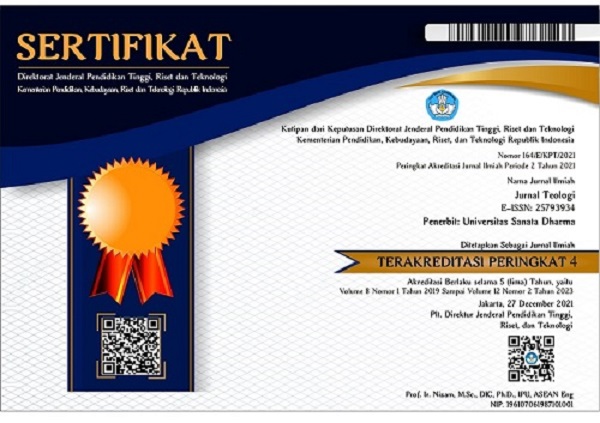INSPIRASI KONSEP KEMANUSIAAN KRISTIANI DALAM SURAT PAULUS KEPADA FILEMON
(1) Parahyangan Catholic University
(*) Corresponding Author
Abstract
Keywords
Full Text:
PDF (Bahasa Indonesia)References
Aryanto, Antonius Galih Arga Wiwin. “The Imagery of Slavery in Romans 6:15-23.” Journal of Asian Orientation in Theology 2, no. 1. (2020): 105 – 121.
Balabanski, Vicky. “Where is Philemon? The Case for a Logical Fallacy in the Correlation of the Data in Philemon and Colossians 1.1-2; 4.7-18.” Journal for the Study of the New Testament 38, no. 2, (2015): 131–150.
Barclay, William. The Letters to Timothy, Titus, and Philemon. Philadelphia: The Westminster Pres, 1975.
Bergant, Dianne & Karris, Robert J. Tafsir Alkitab Perjanjian Baru. Yogyakarta: Kanisius, 2002.
Cho, Bernardo “Subverting Slavery: Philemon, Onesimus, and Paul’s Gospel of Reconciliation.” Evangelical Quarterly 86, no. 2 (2014): 99-115.
Durken Daniel. (edt) The new Collegeville Bible commentary. Minnesota: Liturgical Press, 2017.
Gerbner, Catarhine. Christian Slavery: Conversion and Race in the Protestant Atlantik World. Philadelphia: University of Pennsylvannia Press, 2018.
Harrington, Daniel. Paul’s Prison Letter: Spiritual Comentaries on Paul’s Letter to Philemon, the Philppians, and the Colosians. Hyde Park NY: New City Press, 1997.
Harun, Martin. Lukas: Injil Kaum Marginal. Yogyakarta: Kanisius, 2019.
Head, Peter M. “Onesimus the Letter Carrier and the Initial Reception of Paul’s Letter to Philemon.” The Journal of Theological Studies. Vol. 00 (2020): 9.
Heuken, A. Ensiklopedi Gereja IV. Jakarta: Cipta Loka Caraka, 1994.
Ismartono, I., dkk. Rekonsiliasi: Menciptakan Hidup Damai dan Sejahtera. Jakarta: LPPS-KWI, 2002.
Komisi Kitab Suci Kepausan. Penafsiran Alkitab Dalam Gereja. Yogyakarta: Kanisius, 2020
Leon-Dufon, Xavier. Ensiklopedi Perjanjian Baru. Yogyakarta: Kanisius, 1990.
Marsunu, YM Seto. Proto-Paulinum. Jakarta: Lembaga Biblika Indonesia, 2008.
Scheunemann, Rainer. Surat Paulus kepada Filemon. Jakarta: Gunung Mulia, 2015.
Schreiters, Robert J. Pelayanan Rekonsiliasi. Ende: Nusa Indah, 2001.
Smith, Mitzi J., dkk. Onesimus Our Brother Reading Religion, Race, and Culture in Philemon. Minneapolis: Fortress Press, 2012.
Suprandono, Yohanes Rahdianto & Setio, Robert. “Perbudakan dalam Perjanjian Lama: Sebuah KajianTekstual dan Intertekstual atas Teks-teks Perbudakan dalam Perjanjian Lama.” Dunamis: Jurnal Teologi dan Pendidikan Kristiani 6, no. 1, (2021): 298-313.
Suwito. Mengampuni tujuh puluh kali tujuh kali. Malang: Dioma, 2001.
Wenno, Vincent Kalvin. “Pendekatan Paulus dalam Penyelesaian Konflik Perbudakan: Analisis Sosio-Historis Terhadap Surat Paulus kepada Filemon.” Gema Teologika 7 no. 1, (2022): 65.
Wet, Chris L. De. The Unbound God: Slavery and Formation of early Christian Thought. New York: Routledge, 2018.
Williams, David J. Paul’s Metaphors: Their Context and Character. Massachusetts: Hendrickson Publishers, 1999.
DOI: https://doi.org/10.24071/jt.v12i01.5959
Refbacks
- There are currently no refbacks.

This work is licensed under a Creative Commons Attribution-ShareAlike 4.0 International License.
.jpg)
Indexed and abstracted in:
P-ISSN: 2302 - 5476 (Validity starting Volume 2012-10-05)
E-ISSN: 2579 - 3934 (Validity starting Volume 6, No. 1, Mei 2017)
Jurnal Teologi (Journal of Theology) by Faculty of Theology Sanata Dharma University

This work is licensed under a Creative Commons Attribution-ShareAlike 4.0 International License














